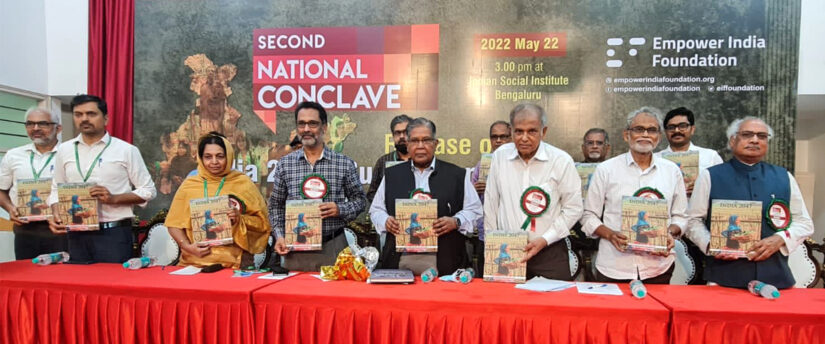‘India 2047: Empowering the People’ Supplementary Edition 2021 Released
The Supplementary Edition 2021, a supplement to the Empower India Foundation (EIF) flagship document ‘India 2047: Empowering the People’ was released by former Union Minority Minister and former Rajyasabha Deputy Chairperson Dr. Rahman Khan at the concluding session of the Empower India Second National Conclave held at the Indian Social Institute, Bengaluru on 22nd May 2022
Empower India Foundation is in the second phase of Project India 2047. It was decided to enter the second phase with a document updating the data tables and reviewing the developments in the county in the five years following the release of the EIF flagship document ‘India 2047, Empowering the People’, a Vision-to-Action Document which was released on 15th August 2016, the 70th Independence Day of the country at the India 2047 National Conclave held in New Delhi, by the late honourable justice Rajinder Sachar.
Thus, this Supplementary Edition 2021, a supplement to the Project Document was prepared, incorporating a review of the past five years’ activities post the document release, i.e., from 2016 to 2021, reviews on the socio-political-economic-educational developments during this period and an update of the data tables in the first edition.
The introductory section of the Supplementary Edition 2021 starts with Quranic verses followed by Foreword: 25 Years to 2047 penned by the EIF chairperson Mohammed Raphy. A Message “Together for a Bright Future” from our vice-chairperson Prof Nishath Khalida Parveen is the second item in the document.
Editorial, “Rolling Stone Gathers No Moss” by Executive Editor Mohamed Asif Ben Mammutty is the next article.
In the past 5 years, EIF has lost around half a dozen of its motivational founders and associates. The next chapter of the document, “Bereavement: Their Vision Guides Us” reminisces them.
A total of 12 chapters covering various issues, the project journey, etc. have been included in the first and second parts of the document, and the third part is Data Tables. Efforts have been taken to update the data tables with the latest data available.
The first part, National Situation Overview, contains seven chapters starting with an article by Prof P Koya titled “Society and Politics: Changes and Challenges”, a comprehensive analysis of the socio-political situation in the country in the past five years, “Socio-economic Condition of Muslims in India” written by Dr Khalid Khan, an analysis of the status of the economy, health and education in the country, “Trends in Muslim Political Representation”, a study of the political status of Indian Muslims written by Mohammed Sabith, “Budget and Minorities: Need for Community Participation”, an informative article by Dr Jawed Alam Khan which emphasises the need of community involvement in ensuring availability and utilisation of the budget share for minorities, “Muslim Education: Still on The Back-Seat” an analysis of the educational backwardness of Indian Muslims with the support of authentic statistics by Aariz Muhammad, “Status of Sachar Recommendations: An Overview” by Mohamed Shaffeeq which sheds light on the actions taken by the governments on the Sachar Committee Report, and a motivational article by EM Abdul Rahiman, “Opportunities in Challenges” which reminds us there is light at the end of the tunnel, and there is no need for frustration for the community, are the other articles in this part.
The second part titled “Project Journey,” starts with the revised Chapter 5: “Project Frame & Focus Areas” and Chapter 17: “Organisation and Infra Structure” from the original project document (Chapters 8 & 9 in the Supplementary Edition). The revisions are about certain redefined objectives of EIF such as EIF acting as a supporting think tank of the community giving emphasis to research activities, relations building and outreach, and grassroots level empowerment activities through the formation of local Chapters.
In chapter 10, “Project History: Experiences and Aspirations” Mohammed Raphy takes the readers to the evolvement of Project India 2047 and the experiences and the lessons learnt during the first phase.
Chapter 11, “Project Priorities: New Phase and Renewed Tasks” written by Mohamed Shaffeeq is the detailed move ahead plan from the second phase onwards.
Chapter 12, Phase II journey, scribed by Faiz Mohammed covers the EIF activities in the past two years.
The third part contains the data tables related to the 11 focus areas described in the project document.
The fourth part, Annexure, is the description of the task force that leads Empower India Foundation. It describes the Project Team that consists of the Advisory Board, Board of Trustees, EXCOM, Admin Team, EIF Chapters, State Coordinators and the Editorial Board.
The Acknowledgement section after the fourth part acknowledges the services of a few brothers who have provided a wide variety of services such as participating in discussions, collecting data and writing content for EIF.
The Photo Gallery at the end portrays photos of various activities and events that have been undertaken and conducted by Empower India Foundation in the first phase.
The e-copy pdf of the Supplementary Edition 2021 can be accessed by clicking this link:

